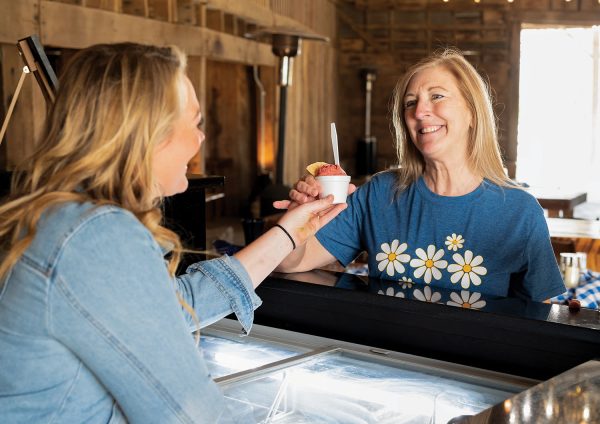Speaker shares story of Ugandan immigration
September 19, 2014
Kate Saller brought her book to life to an intimate audience in the back corner of Barnes and Noble Thursday evening. Saller is the author of the book “The Moon in Your Sky: Immigrant’s Journey home to Uganda,” and was the first speaker of the semester for the “Far Away Places” lecture series.
The story follows Annah Emuge, one of Saller’s friends on both journey to from Uganda to the United States, and back again.
Saller met Emuge while working with Rotary International. Rotary brought her to Uganda where Annah grew up.
Saller read many excerpts from her book to the audience and provided additional background information about specific passages of the journey.
She said that water is the most important thing that the people need in Uganda and other African countries.
“While it is important to remove polio as a threat to these children, it is not their most dire need. They have much simpler, more basic needs; and that is water,” she said.
Saller was in Niger before going to Uganda and said that the water is what causes a lot of the health issues.
“The one river in the country of Niger is the Niger River and it is where they bathe, wash their dishes, wash their clothes, bring their animals to drink and then they bring the water back and their children drink it,” she said.
While sharing Emuge’s story, Saller said this was what the women in Emuge’s village had to do as well, though that was not their only struggle.
She said Emuge’s mother was very passionate about providing her daughters with schooling. The closest school for her was seven miles away and she had to walk there and back every day. However, this was the least of Emuge’s problems; the soldiers there would frequently sexually abuse the people and Emuge was forced to sleep behind a bush to stay hidden.
“Annah made it through all of her schooling without ever being touched by a soldier. It was a difficult time and yet it was a time when Annah thrived,” Saller said. “She went through school, she got her dream job, she became a nursing intern at a small clinic. During that time the threats from soldiers became worse and worse.”
Saller said it got to the point where people in the village would sleep in trees to hide from the soldiers.
“They would finish work, take food out to the bush eat it and try to sleep there,” she said.
This is where Emuge met James, and ended up having four children with him.
“Love bloomed under these trees while hiding from the soldiers,” Saller said.
James was offered a chance to go to the US and get an education, paid for by the Ugandan government. However, while they were there the government was overthrown and they were forced to say in the US.
“They raised the four kids while working in McDonalds. This was devastating to James. He had been a proud, intelligent, successful man in Uganda, taking care of his family, helping millions of children and doing exactly what he wanted to be doing,” Saller said. “And suddenly he was working as a fry cook in a fast food restaurant. He became an alcoholic.”
Emuge was eventually able to make it back to her home. James passed away in the U.S. When she returned home, she lived a life full of helping children of her village and mothering them all.
The audience at Barnes and Noble listened intently as Saller told Emuge’s story.
“It was a great human compassion piece that is genuine and really. Even though Annah is so far away from us she really seems relatable,” Anna Yacovone, a Bowling Green local said.
Saller stayed around at the end of the event to answer questions and sign books. All of the money she gets from the books goes back to Emuge and her village.
Saller has experienced some very inspiring moments in her life. However, she says that the most memorable one is a simple interaction with a young boy.
“When I was in Niger we would go to different villages to immunize children. We had to get permission from the village elders first though. One day when I was standing waiting for the formalities to be worked out I felt a weight against my leg. There was a small boy who leaned up against my leg. I rubbed his head and he just stood there for a few minutes,” she said. “When it was time to go he looked up at me and he hadn’t realized who I was. He had never seen a white person before and he was scared.”
Saller said the boy’s expression soon changed. He smiled at her and ran away.
“It was such a human connection and it didn’t have to do with religion, ethnicity or politics; we just connected. Thats something that will always stand out,” she said.













![Students cheer for Senator at Large Jaden Marshall after being announced as the Intercultural Student Engagement Center Senator for the 24th Senate on Wednesday, April 17 in the Senate Chamber in DSU. Ive done everything in my power, Ive said it 100 times, to be for the students, Marshall said. So, not only to win, but to hear that reaction for me by the other students is just something that shows people actually care about me [and] really support me.](https://wkuherald.com/wp-content/uploads/2024/04/jadenmarshall-1200x844.jpg)




![Megan Inman of Tennessee cries after embracing Drag performer and transgender advocate Jasmine St. James at the 9th Annual WKU Housing and Residence Life Drag Show at Knicely Conference Center on April 4, 2024. “[The community] was so warm and welcoming when I came out, if it wasn’t for the queens I wouldn’t be here,” Inman said.](https://wkuherald.com/wp-content/uploads/2024/04/smith_von_drag_3-600x419.jpg)






